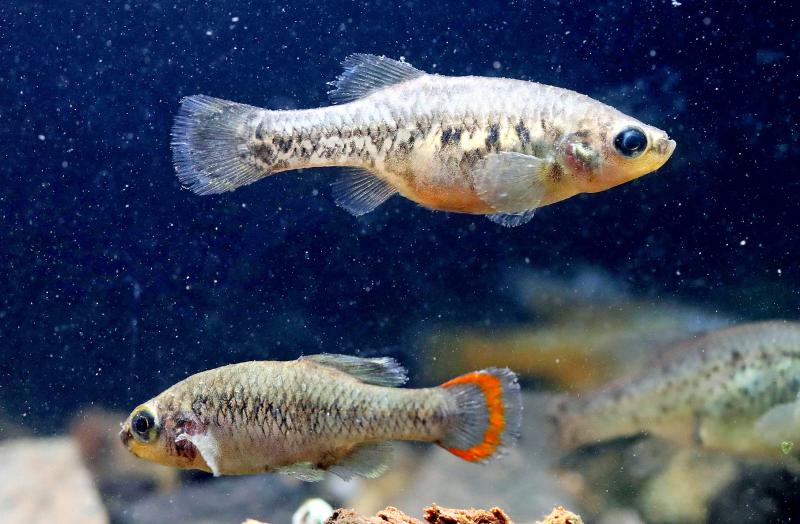Residents of a small town in western Mexico are celebrating the reintroduction into the wild of the tequila fish — an endemic species saved from the brink of extinction.
The fish, whose scientific name is Zoogoneticus Tequila, was rescued in the 1990s by US and British conservationists who kept it in aquariums and helped it return to its original habitat in the Teuchitlan river.
Children in Teuchitlan, home to about 10,000 people, have been at the forefront of efforts to inform visitors not only about the importance of keeping their habitat clean, but also about the tequila fish.

Photo: AFP
“The children are the ones who approach people on the river bank and tell them that in this river lives a little fish that is unique in the world ... and that they participated in its reintroduction,” said Consuelo Rivera, a 70-year-old retired teacher.
The tequila fish was reported to be extinct in 1998, possibly due to fragmentation of its habitat, pollution and competition from non-native species, the International Union for the Conservation of Nature (IUCN) said.
The species survived only in captivity for several years until conservationists, led by Michoacan University, began the process in 2014 to reintroduce it into the wild.
Since then the fish has gone from strength to strength, helped by the last major release of fish in 2018, project leader Omar Dominguez said.
The tequila fish grows to about 7cm and the male has a bright reddish-orange tail.
It shares the name of the world-renowned Mexican liquor originating in the town of Tequila, which, like Teuchitlan, is in the state of Jalisco.
The species has unique characteristics, such as giving birth to well-developed fetuses, which it feeds through a kind of umbilical cord similar to that of humans, Dominguez said.
“It’s an important part of the ecosystem. It’s a carnivorous species and it feeds, for example, on mosquito larvae, which keeps ecosystems healthy for humans,” he added.
There are now estimated to be 1,500 to 2,000 tequila fish in the wild and the species is listed as endangered by the IUCN.
The civil society group Guardians of the River carries out educational campaigns and workshops for children and adults to show them the flora and fauna of the area.
Tourism also plays an important role in the initiative.
Local visitors bathe in spa pools around the river said to have therapeutic properties, and swim with the fish — also known as gallito (little rooster) because of its colorful tail.
“There are a lot of little fish. They swim together with people and sometimes the little fish also start to bite people, to caress them,” said Maria Aurea Martinez, a spa employee.
Jaime Navel, a local parish priest, sees the species as “the little fish that was resurrected, that came back to life.”
“There’s awe and joy in the community,” he said.

Packed crowds in India celebrating their cricket team’s victory ended in a deadly stampede on Wednesday, with 11 mainly young fans crushed to death, the local state’s chief minister said. Joyous cricket fans had come out to celebrate and welcome home their heroes, Royal Challengers Bengaluru, after they beat Punjab Kings in a roller-coaster Indian Premier League (IPL) cricket final on Tuesday night. However, the euphoria of the vast crowds in the southern tech city of Bengaluru ended in disaster, with Indian Prime Minister Narendra calling it “absolutely heartrending.” Karnataka Chief Minister Siddaramaiah said most of the deceased are young, with 11 dead

By 2027, Denmark would relocate its foreign convicts to a prison in Kosovo under a 200-million-euro (US$228.6 million) agreement that has raised concerns among non-governmental organizations (NGOs) and residents, but which could serve as a model for the rest of the EU. The agreement, reached in 2022 and ratified by Kosovar lawmakers last year, provides for the reception of up to 300 foreign prisoners sentenced in Denmark. They must not have been convicted of terrorism or war crimes, or have a mental condition or terminal disease. Once their sentence is completed in Kosovan, they would be deported to their home country. In

DENIAL: Musk said that the ‘New York Times was lying their ass off,’ after it reported he used so much drugs that he developed bladder problems Elon Musk on Saturday denied a report that he used ketamine and other drugs extensively last year on the US presidential campaign trail. The New York Times on Friday reported that the billionaire adviser to US President Donald Trump used so much ketamine, a powerful anesthetic, that he developed bladder problems. The newspaper said the world’s richest person also took ecstasy and mushrooms, and traveled with a pill box last year, adding that it was not known whether Musk also took drugs while heading the so-called US Department of Government Efficiency (DOGE) after Trump took power in January. In a

LOST CONTACT: The mission carried payloads from Japan, the US and Taiwan’s National Central University, including a deep space radiation probe, ispace said Japanese company ispace said its uncrewed moon lander likely crashed onto the moon’s surface during its lunar touchdown attempt yesterday, marking another failure two years after its unsuccessful inaugural mission. Tokyo-based ispace had hoped to join US firms Intuitive Machines and Firefly Aerospace as companies that have accomplished commercial landings amid a global race for the moon, which includes state-run missions from China and India. A successful mission would have made ispace the first company outside the US to achieve a moon landing. Resilience, ispace’s second lunar lander, could not decelerate fast enough as it approached the moon, and the company has